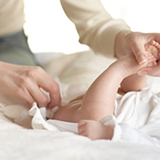- Food sensitivity In formula-fed babies, certain brands of formula may be more difficult for the baby to digest, and this will vary among different babies. Breastfed babies can be sensitive and react to foods that the mother ate. For those who have started on solids, some foods may also cause a reaction, though most of the time they will outgrow it.
- Food allergy Allergies not only cause a stomach upset, other symptoms such as difficulty breathing or a rash are likely to show up as well.
- Too much foremilk Breastfed babies whose stools appear loose, greenish and mucus-streaked may be taking in too much foremilk and not enough hindmilk. Ensure that your baby has finished feeding from one breast before switching to the other.
- Infection Diarrhoea is also a symptom of intestinal infections such as gastroenteritis (more commonly known as stomach flu). This may be accompanied with vomiting (refer to article 6).
My baby has loose stools. What should I do?

babyadmin |
Before your child is able to let you know when they are sick, doctors often advise to observe their stool. This may, however, make you worry in trying to determine what is normal. For all babies, their stools will change as they rid themselves of meconium (babies’ first stools), and transition from breast milk or formula to solid food. Stools from breastfed babies are also different compared to formula-fed babies.
If you are breastfeeding your baby, do not be alarmed if their stools appear loose. This is normal. Formula-fed babies have firmer stools, since formula is harder to digest.
Signs of Diarrhoea
To determine if your child has diarrhoea, you must first determine what is normal for your baby. Observe both the frequency and the consistency of your child’s bowel movement. There is no fixed standard for all babies. It is normal for breastfed babies to pass motion once every 3 days, or even as often as up to 10 times a day. You will find that eventually your child will fall into a daily pattern and generally passes motion at around the same time everyday.
As a general guideline, your child may have diarrhoea if the frequency of their bowel movements increases by 1.5 to 2 times within a 24-hour period. This is especially so if the stools appear mucus-streaked and looser than usual. Colour change may also be signal an underlying problem.
Causes of Diarrhoea
As a symptom to an underlying problem, diarrhoea may be caused by:
